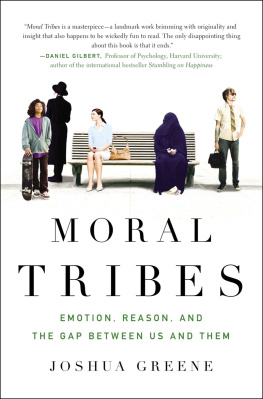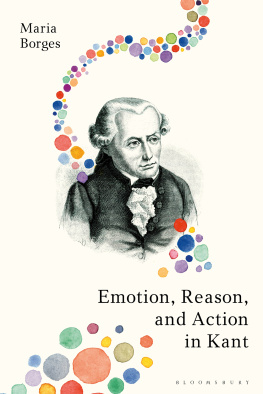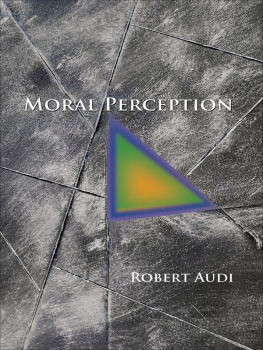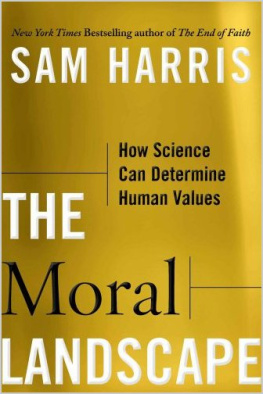Copyright 2013 by Joshua D. Greene
Penguin supports copyright. Copyright fuels creativity, encourages diverse voices, promotes free speech, and creates a vibrant culture. Thank you for buying an authorized edition of this book and for complying with copyright laws by not reproducing, scanning, or distributing any part of it in any form without permission. You are supporting writers and allowing Penguin to continue to publish books for every reader.
Excerpt from My Favorite Things, music by Richard Rodgers and lyrics by Oscar Hammerstein II. Copyright 1959 by Richard Rodgers and Oscar Hammerstein II. Copyright renewed. Williamson Music owner of publication and allied rights throughout the world. International copyright secured. All rights reserved. Used by permission.
Illustration credits appear on pages 407408.
Moral tribes : emotion, reason, and the gap between us and them / Joshua D. Greene.
Includes bibliographical references and index.
Ethics. Emotions. Civilization. I. Title.
Trolleyology
T his is where my main line of research comes into our story. But first, Ill say a bit about how I got into this business and why I think it matters.
In the eighth grade, I joined my schools debate team. I did LincolnDouglas debate, in which two debaters argue opposite sides of a resolution. The resolutions were determined by a national committee and changed every couple of months. I recently discovered the resolutions of my geeky youth online. Here are the ones from my sophomore year of high school:
- Resolved: that the United States ought to value global concerns above its own national concerns.
- Resolved: all United States citizens ought to perform a period of national service.
- Resolved: communities in the United States ought to have the right to suppress pornography.
- Resolved: development of natural resources ought to be valued above protection of the environment.
- Resolved: individual obedience to law plays a greater role in maintaining ethical public service than does individual obedience to conscience.
Although I didnt realize it at the time, these are all commons problems, questions about the terms of cooperation, both for individuals within a society and for nations among nations.
Filing into empty high school classrooms on evenings and weekends, donning ill-fitting Reagan-Thatcher power suits, my fellow debaters and I reenacted the philosophical battles of the new pastures, passionately defending the policies to which we were randomly assigned. I quickly developed a standard debating strategy. At the start of the debate, each debater presents a value premise, the value that one regards as preeminent. For example, if you were arguing against the suppression of pornography, you might make your value premise freedom. If you were arguing for obedience to law over obedience to conscience, you might make your value premise security. Next youd argue for the preeminence of your value premise. For example, if your value premise is security, you might recite a few choice words from Thomas Hobbes and argue that security comes first because security is necessary for realizing other values. Then, with your value premise in place, you would argue that your side best serves the preeminent value.
I didnt like the standard value premises (freedom, security), because it seemed to me that, no matter what your most favored value is, there could always be other considerations that take precedence. Sure, freedom is important, but is it everything? Sure, security is important, but is it everything? How can there be one preeminent value? Then I discovered utilitarianism, the philosophy pioneered by
Utilitarianism is a great idea with an awful name. It is, in my opinion, the most underrated and misunderstood idea in all of moral and political philosophy. In parts 3 through 5, well talk about why utilitarianism is so wise, misunderstood, and underappreciated. But for now well start with a simple understanding of utilitarianism thats good enough to get us into its psychology. By the end of this chapter, your feelings about utilitarianism will likely be mixedor worsebut thats okay. Ill work on winning you over in parts 3 through 5.
So whats the big idea? Utilitarianism says that we should do whatever will produce the best overall consequences for all concerned. (Strictly speaking, what Im describing here is consequentialism , a broader philosophical category that includes utilitarianism. More on this in .) In other words, we should do whatever promotes the greater good. For example, if option A will kill six people and save four people, while option B will kill four people and save six people, and if all other consequences are equal, then we should choose option B over option A. This idea may strike you as so painfully obvious that it hardly deserves to be called an idea, let alone a great idea. But as well see shortly, its not at all obvious that this is a good way to think about moral problems in general . And, as well see in parts 3 through 5, applying this principle in the messy real world is not at all simple, and very different from what people tend to envision when they imagine utilitarianism in practice.
As a debater, I liked utilitarianism because it gave me a value premise that itself allowed for the balancing of values: Does freedom outweigh security? Or does security outweigh freedom? Utilitarianism has a sensible answer: Neither value takes absolute precedence. We need to balance the values of freedom and security, and the best balance is the one that produces the best overall consequences.
Pleased with this general strategy, I made utilitarianism my value premise in every debate, no matter what side I was on. I began each round with my standard utilitarian spiel, peppered with authoritative quotations from Mill and friends. From there it was just a matter of cherry-picking the evidence to show that, indeed, the greater good was served by the side to which Id been assigned.
This strategy worked pretty well. I used utilitarianism not only as my own value premise but also as a weapon for attacking the values of my opponents. Whatever my opponent proffered as the preeminent value, I would pit that value against the greater good, and in the most dramatic possible way. I would begin in cross-examination, the part of the debate in which opponents question each other directly, rather than making speeches. For example, if my opponent was pushing free speech, Id whip out my stock counterexample:
ME: You say that free speech is the most important value in this debate, is that right?
MY UNWITTING OPPONENT: Yes.
ME: And therefore, no other value can take precedence over free speech, is that right?
MY UNWITTING OPPONENT: Yes.
ME: So... Suppose that someone, just for fun, shouts Fire! in a crowded theater, and this causes people to rush to the exits, and some people get trampled and die. Is the right to shout Fire! more important than the right not to be trampled to death?










